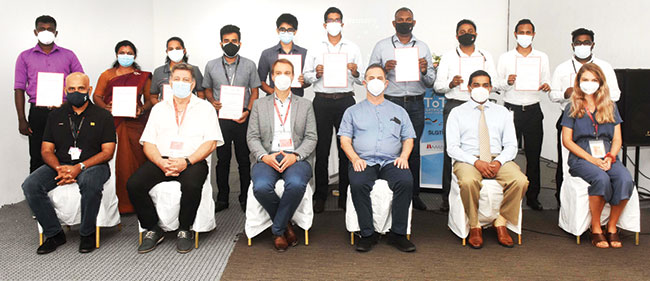Business
Germany supporting Sri Lanka to keep up with latest technological developments in apparel sector

At present, Sri Lanka accounts for around 1% of the global market share of apparel exports, and Sri Lanka’s apparel sector is well positioned to reach the industry’s target of $8 billion in export earnings by 2025. With these targets in sight, Sri Lanka’s apparel sector will have very high demands for skilled technicians, especially in the area of mechatronics, where the industry is moving into advance factory automations.
In order to fulfill the demand of qualified workforce in the apparel sector, Deutsche Gesellschaft für Internationale Zusammenarbeit (GIZ) GmbH- Vocational Training in Sri Lanka project on behalf of the German Federal Ministry for Economic Cooperation and Development (BMZ) partnered with Sri Lanka German Technical Institute (SLGTI) and MAS Holdings (Pvt) Ltd to commence a NVQ Level 5 Autonomation technician course to provide advanced theoretical and practical hands-on training for youth to work with the latest state-of-the-art machinery.
Prior to the commencement of the training, a Training of Trainer (ToT) course was conducted for in-company trainers at MAS in order to prepare and structure the two year training programme. In-company trainers who successfully completed the training received their certificates at the MAS Intimates facility in Ratmalana.
Speaking at the certificate awarding ceremony, Chairman of the SLGTI and CGTTI Vinod Moonesinghe said, “So far we have followed the practices from 19th century training in technical field work. It has always been a question of people going into technical colleges, theoretical learning, learning from the practice and then being thrown into the industry. Recently we have found out that this model lacks a lot. We are taking off to an entirely new trajectory as far as training is concerned. We need to train people specifically for the jobs that they will be doing in the industry. Then only we can address the job market as well as bring best overall results of the trainings”, Mr Moonesinghe said.
Head of Project, Vocational Training in Sri Lanka Project (VTSL), Mathis Hemberger said, “The philosophy of German engagement has always been to foster cooperative training where not just training institutes in the TVET sector produce the right skills, but private sector and TVET institutes jointly take the responsibility and add value. This partnership that exists between SLGTI, MAS and GIZ is a flagship example where public sector, private sector and development partners come together, join forces and create something that really has added value”.
The cooperative training approach based on the German dual system combines the advantages of two training modes (theory and industrial on-the-job training (OJT) in an integrated and coordinated process, with emphasis on the practical skills required at the shop floor. In such type of training, MAS as the industry partner and SLGTI as the public partner will share their expertise, facilities, and other specialized resources and establish a linkage between vocational training and industry.
Director-Innovation, MAS Intimates, Dr Chandika Wickramatillake said, “There’s a huge demand in MAS. We are looking to move from traditional apparel manufacturing to smart technologically advanced apparel manufacturing. We have very experienced mechanics and during the last five years, we have invested a lot in engineers. However, we have observed that there’s still a gap between mechanics and engineers, creating a need for technicians. This is a perfect time because we are looking at strengthening our staff capabilities at our factories. MAS is an international company having an ever growing global presence. These students who come from our villages will be exposed to latest technology and developments in apparel manufacturing and we need to support them. The trainers who received the certificates today have a big role to play in keeping up with technological developments, to learn and disseminate their learnings to these students. We find a lot of communication gaps because the students come from rural areas”, Dr Wickramatillake said.